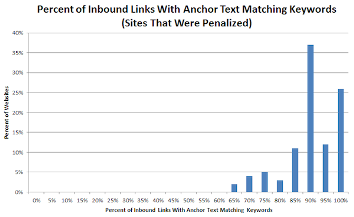How Out of Hand Anchor Text Sinks Sites
Clothed in cute monikers, the Google algorithm updates of May have sought to penalize websites with poor quality content (Panda) and manipulative tactics such as over optimization and link spamming (Penguin). While algorithm updates that knock spam websites out of the top spots are welcome, the latest Penguin update struck a nerve with content marketers and webmasters who followed the rules and were penalized for subscribed to a long-standing SEO strategy: exact anchor text matches play leading roles in search rankings.
 It Hurts to be Too Exact
It Hurts to be Too Exact
What does this look like? If your website sells bananas, then you may have been making all of your links just on the words “banana” or “bananas.” A few are fine (the safe number seems to be fewer than 50% of inbound links may be exact match) to help you rank on your most accurate, competitive “money” keywords, but overusing exact match anchor text will now bring Penguin’s questioning gaze—and perhaps a penalty.
Be Partial with your Anchors
So what’s a sinking site to do with all those rotten links? For starters, don’t scrap your entire link profile! Tackle your link profile in segments, starting with the overabundance of exact matches. Scrap the ones that are connected to unrelated sites, spam sites or poor quality content (this includes extremely vague content). Maintain your good ones by incorporating a variety of partial matches on your site, as well as asking those linking to you to incorporate partial matches. The banana seller I previously mentioned might anchor links to partial phrases like “where to buy bananas” or “banana recipes.”
And if you’ve made it this far and still don’t know exactly what links are getting you down, then stop by such sites as ahrefs, Open Site Explorer or MajesticSEO. There, you can get a quick analysis of your link profile and see how diverse your anchor text currently is to find out what holes need patching.
Harvin Bedenbaugh
EVG Project Manager



